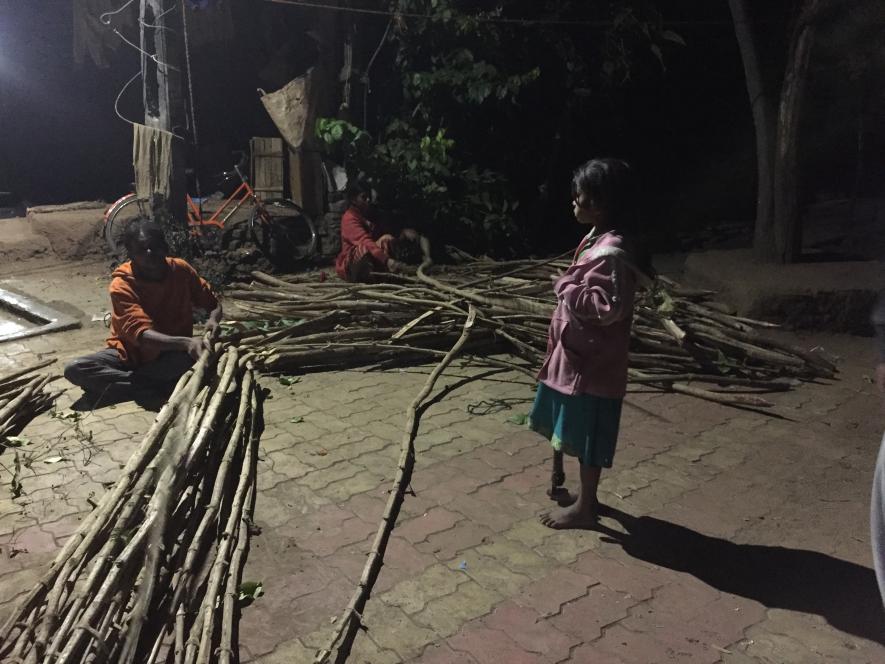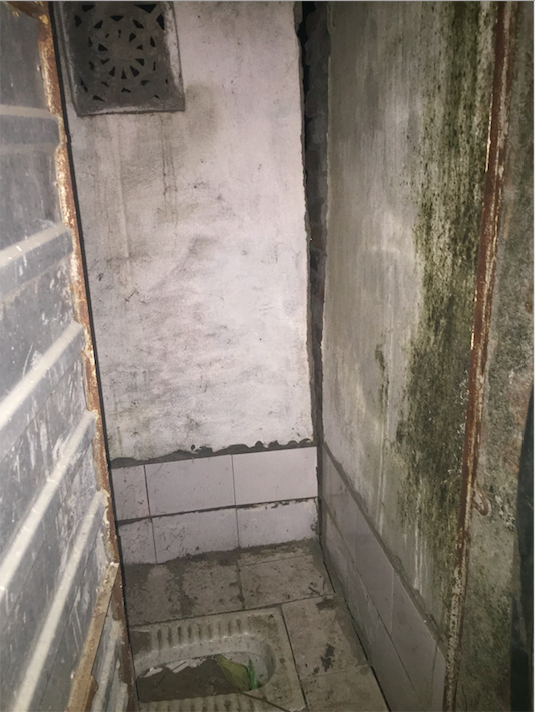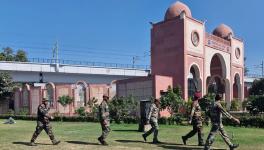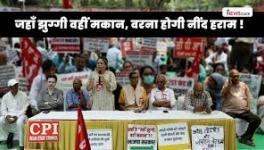In Tribal Villages of South Gujarat, People Angry At Neglect

Gujarat’s tribal population seems to be disillusioned with the so called ‘Gujarat Model’ of development and good governance, propagated by prime minister Narendra Modi and his party.
“For me, all claims of ‘vikas’ are meaningless because we are not at all its beneficiaries. We are so unimportant and neglected that no one from political parties bothers to visit us even during elections, forget about general days,” Paniben Gamit Gulabbhai, a resident of Dussehra Peepardi village in Mandvi tehsil of Surat told NewsClick.
“On polling day, one thing is for sure – we will vote against the BJP because it has lost our trust,” she added.
Paniben has to work in field as a daily wage labourer to make ends meet. She has four daughters and an ailing mother to support. She earns just Rs 25-35 per day despite working for the entire day in the fields. To supplement this, she runs a small grocery shop in her village. Her eldest daughter had to leave studies after 12th because the family could not afford it.
In other tribal villages of Vadodara and Surat in southern Gujarat there is a palpable sense of discontent and desire for change as tribal villagers complain of lack of jobs, low wages, non-availability of basic amenities like drinking water and drainage. Many are also angry at land being snatched away for projects. This discontent could spell more trouble for the ruling BJP which is fighting the upcoming Assembly elections with its back to the wall.
Scheduled Tribes number about 89 lakh in the state, that is, about 15% of the total population. Vadodara district has nearly 28% tribal population while Surat district has only a small pocket of tribal communities making up just 3% of the district’s population. Although bill boards and banners claim that the ruling BJP has done huge amount of work for tribals, the ground reality is quite the opposite.
Dussehra Peepardi has around 60 houses that are inhabited by at least 500 people. Though there are five standposts (water taps) but the village still suffers water scarcity. The civic body supplies drinking water thrice a day for one-and-a-half hour each time. As a result, people have to stand in queues at each standpost for filling up drinking water. Often, there are fights in the queues. Women folk of most of the families here work as domestic help to support their families.
Paniben’s neighbour Nanubhai Rathore also shares her sentiments. “I am a daily wage labourer. I load and unload heavy goods for Rs 100-125 per day. Even this meagre income is not regular. We go to market for work. In a week, we have to return empty handed on at least two-three days because of unavailability of work. Demonetisation and implementation of GST have broken the backbone of traders whose sales and purchase have gone down. This has impacted our livelihood as well,” he said.
Although Prime Minister Narendra Modi has been strongly campaigning for building toilets but this tribal village in his home state has no proper toilet.

“The government has outsourced construction of toilets in such backward villages to private agencies which are paid Rs 12,000 for each toilet. They built squat toilet on a narrow piece of land where people cannot even sit properly. The toilets don’t have tanks or connection to drains. They are useless,” said another inhabitant of the area while showing a toilet which was badly damaged because of the poor quality material used in the construction. He and his family put in the labour for constructing the toilet.
The area has a private hospital but does not have any health centre run by the government.
12-year old Payal Nileshbhai Rathore, a class 7 student, wants to study and get a government job so that she can improve the economic condition of her family. But she sees a dark future ahead.
“My father is a labourer and he cannot afford the expenses for my education. There is no school in the area, except the one run by anganwadi. The high school is far away from here where I cannot go on foot on my own,” she told NewsClick with visible despair on her face.
The tehsil has three primary schools and two high schools for a population of more than two lakhs people. Many of the sanctioned post of teachers are lying vacant for years.
Tarunaben Sambhabhai Rathore (12) is class eight dropout. Her father passed away few years ago and mother works as domestic help to run the family. She too had dreams which, she says, is not possible to fulfil now.
Jagdishbhai Thakorebhai Rathore, who was cutting wood to for cooking food at night, complains about inflated electricity bills. “Our land was acquired for construction of power plants and we were left landless. And we get electricity bills of Rs 400-500 every month. How can we afford it in a situation when we have to struggle everyday even for rotis?” he asked.
Mandvi has three power plants – thermal, hydro and nuclear – which have been built by acquiring the land of tribals on token compensation rates. But the electricity is not subsidised here. Despite generating surplus electricity, the power giants charge Rs 5 per unit for the consumption of first 200 units. It goes on increasing when the consumption limit exceeds.
Those who depend on agriculture are also frustrated and voice their resentment against the government. They complain that they do not get proper prices for their crops. “The cost of diesel, fertiliser and seeds have gone up, but the prices we get for our crops have drastically gone down. A 50-kg bag of DAP (a fertiliser) used to cost us Rs 600 and urea Rs 190 five years ago. Now it costs Rs 1,230 and Rs 310 respectively. But paddy price has gone down to Rs 1,200-1,300 per 100 kg from Rs 1,500-1,800 per quintal earlier. The drought and other weather conditions make the matter worse,” said a tribal farmer Vichya Rai Sinh Rathore, a resident of Pansoli Narmada Vasahat in Turkheda village in Vadodara district.
Vichya along with thousand of tribals from 23 villages were displaced from Narmada district after their land was acquired for Narmada Dam Project 25 years ago. They were rehabilitated on 5,000 acres of land in and around Daboi tehsil in the district by the Congress government in the state.
They are angry with the saffron party because their demands of a government job to one member of each family, allotment of five acres of land to all those who were minors at that time but now have grown adult, water for irrigation and provision of all priviliges the Schedule Tribes get have not been met for the past 22 years.
They are still holding protests at Kewaria Colony, near Sardar Sarovar Dam, in Narmada district. “When Modi came to Daboi to finalise the Narmada Dam Project, we were assured that our demands will be met. We were asked to call off the strike and vacate the area in view of the PM’s visit. But later, it turned out to be merely a lip service. We were betrayed once again,” Vichya alleged.
Though each family was allotted five acres of land in and around Daboi in Vadodara district, many of these tribals claim that they used to have 20-25 acres of land earlier in their villages. They are also demanding a separate panchayat in the areas where their concentration is higher so that their voices are heard.
All the tribals who were earlier rehabilitated were given lands in tribal areas of Vadodara district but those who belong to Narmada district are culturally different from the tribals in the region. They are unable to intermingle with local tribals. They say they are in minority within their own community in justification of their demand for a separate panchayat.
Get the latest reports & analysis with people's perspective on Protests, movements & deep analytical videos, discussions of the current affairs in your Telegram app. Subscribe to NewsClick's Telegram channel & get Real-Time updates on stories, as they get published on our website.
























